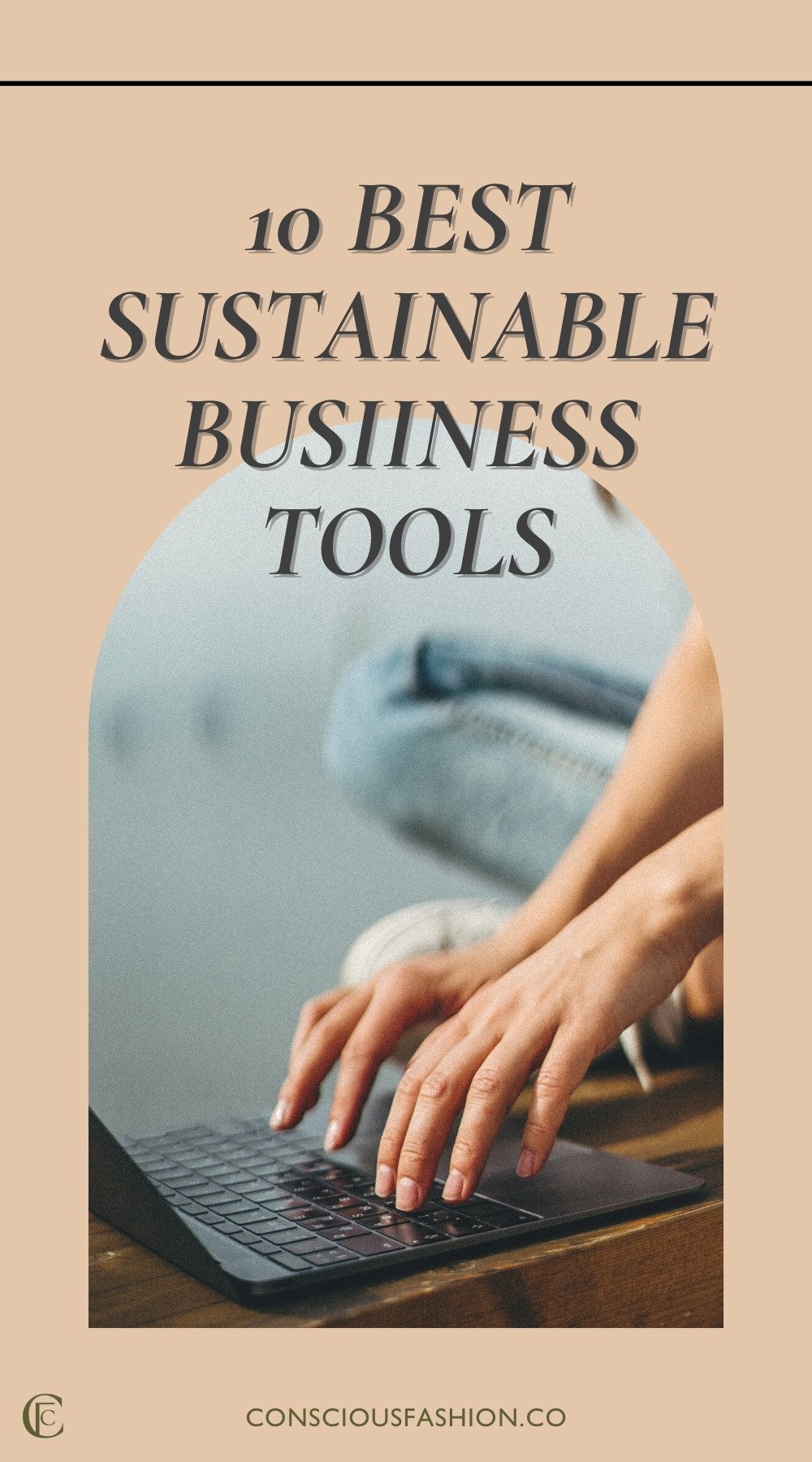10 Business Tools Perfect for Sustainable Freelancers and Entrepreneurs
by Alicia Briggs
Running your own business can be tricky on its own, but figuring out how to navigate being a sustainable entrepreneur or sustainable freelancer can be even tougher. Thankfully, there are numerous business tools available today that will help you be more efficient and eco-friendly
Whether you’re a freelancer, business owner, or student, you can use this article as a handy guide to sustainable business tools that will help your business run more smoothly.
Editor's Note: Did you know that we have a Sustainable Fashion Freelancer Directory where conscious brands can find freelancers? Become a member to get featured!
Why Choose Sustainable Business Tools?
If you’re running your own business or spending most of your time working online or from a computer, there are several reasons to prioritize implementing sustainable business tools. The internet, and our electronic gadgets, use a considerable amount of energy, not to mention our home offices. Common office supplies or invoices often involve generating unnecessary, single-use waste or using unsustainable materials.
When we implement some of the sustainable business tools below, we can reduce our overall carbon emissions and waste.
Design Software:
There is certain software that makes it easy to create professional designs without a design background. Canva is an easy-to-use free option (with option to upgrade) that is a Carbon Neutral Company. They use renewable energy and carbon offsetting.
Plus, their platform has just about anything you could need when it comes to design templates. Fliers, cards, coupons, social media posts, docs, and presentations — you name it, they have it.
Social Media Schedulers:
A social media scheduler will save you time and effort as a sustainable freelancer. Plus, you can support companies that use renewable energy, like Canva.
Sprout Social and Hootsuite are also social media scheduling companies that prioritize social impact and sustainability.
Email Software:
Using email marketing software is an essential social entrepreneur tool. Your email list is an audience that you have ownership over and can more effectively reach compared with a social media audience, which may or may not see your content, depending on the latest algorithm updates.
That being said, each email we send and click on uses CO2. Most email marketing companies use cloud-based storage, but unfortunately, most email marketing companies don’t specify any sustainability or social impact initiatives except for Dotdigital. They use renewable energy and are working toward carbon-neutral status by 2030.
Invoicing Software:
E-invoicing is one of the easiest social entrepreneur tools available. Sending e-invoices instead of paper invoices is an easy way to eliminate paper waste. You can use invoicing software like Square, Freshbooks, Wave, or Intuit, to send invoices and receive payment.
If you’re a freelancer and you receive payment through direct deposit, you can use one of Canva’s free invoice templates to seamlessly send invoices to your clients.
Networking Sites and Coworking Spaces:
Joining networking sites in your industry or local co-working spaces can help you find social entrepreneurship resources and connect with like-minded people. There are numerous industry-specific networking sites, like Women in Marketing or Social Enterprise Alliance.
You can search for Facebook Groups or MeetUp to find groups related to your industry, or even utilize LinkedIn.
For those who want to network in person, consider joining a locally- and/or sustainably-run coworking space. Many coworking spaces are now implementing more sustainable measures like solar energy and eliminating single-use items. Shop around and don’t be afraid to ask questions about how they focus on sustainability and social impact.
Sustainable Hosting Platforms:
Websites can have a significant carbon footprint so an impactful way to reduce your emissions if you have a website is to choose a sustainable hosting platform.
First, you can check the carbon emissions of your website with this website carbon calculator. Then, make the switch to a hosting platform that uses renewable energy. “Green” hosting platforms will implement measures to minimize the carbon footprint of the site, including purchasing reusable energy credits.
Some options for green and efficient hosting platforms include SiteGround, HostGator, DreamHost, and GreenGeeks.
Electronic Energy & Storage Savers:
One thing many of us forget about is that while storing documents, files, emails, and pictures on your computer, phone, or the cloud is a great way to save paper and physical materials, it still uses energy.
There are some simple ways to lessen your storage and reduce your digital energy use for those of us who work from a computer. Delete emails you no longer need, switch to cloud-based storage, close open tabs, free up your computer and phone storage, delete unused apps or software, and clear up your downloads folder.
When it comes to computer energy, head to System Preferences and choose the low-power modes available. Laptops also use considerably less energy than desktop computers.
A couple more ideas to reduce energy use: unplug electronics when charging isn’t necessary and either put your devices on sleep mode or turn them off when not in use.
Sustainably Powered Home Office:
If you work from home, consider the type of electricity you’re using (and how much!). For your home office, try the tips above to minimize energy use.
If you’re located in the US, Arcadia makes it easy to switch to solar energy at home. Plus, homeowners who install a new solar panel system by 2034 may be eligible for a federal tax credit.
Eco-Friendly Planners & Notebooks:
While it’s easy to use digital notepads, and planners, many of us prefer using the physical versions. Unfortunately, anything made from paper is single-use and generates waste. Not to mention most planners or journals have plastic binding or harmful chemicals used for printing.
Check out this guide for eco-friendly planners. We’ve included options for handmade planners with non-toxic ink and FSC-certified paper.
And if you’re looking for notebooks, this sustainable journals guide will have what you need.
Sustainable Office or School Supplies:
Office or school supplies are often essential items to help us organize, strategize or get our work done. However, many common supplies are single-use items, made from paper or plastic and that waste adds up.
For all your sustainable office and school supply needs, we’ve compiled a full list for you here, complete with recycled post-its, biodegradable pencils, refillable markers, and plant-based glue.
Ultimately, there are numerous steps you can take to operate a business more efficiently and sustainably. Whether that’s focusing on small steps to lower your energy at home or digitally, reduce your waste, or eliminate single-use items, any conscious effort makes a difference.
You might also like…
How to Get Experience & Skills For A Sustainable Fashion Career
For more resources + community:
Join the Conscious Fashion Collective Membership
About the Author:
Alicia Briggs is a writer & editor specializing in slow travel & sustainable living. She’s worked in journalism since 2016 and currently writes for a variety of publications such as Sustainably Chic and Hidden Lemur. She has been a full-time traveler since 2018 and runs her own blog, Learning the Local Way, where she covers responsible travel & living tips.














